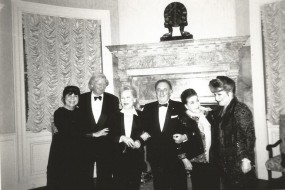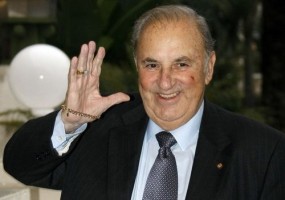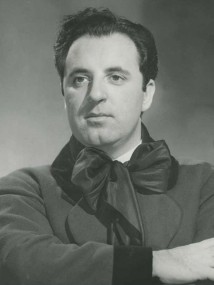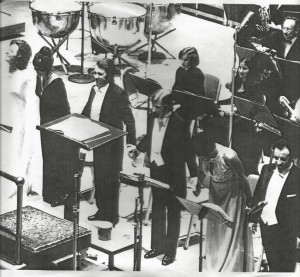Carlo Bergonzi ist tot (* 13. Juli 1924 in Vidalenzo, Italien; † 25. Juli 2014 in Mailand). Er begann seine Bühnenkarriere nach Studium am Konservatorium „Arrigo Boito“ in Parma als Bariton und debütierte 1948 am Theater in Lecce in der Rolle des Figaro in Rossinis Oper Il Barbiere di Siviglia. Obwohl er in der Folge weitere Bariton-Rollen übernahm (u.a. Rigoletto), schulte er 1950/51 auf das Tenorfach um und trat am 12. Januar 1951 in Bari erstmals als Titelheld in Giordanos Oper Andrea Chénier auf. In weiterer Folge entwickelte er sich zu einem der führenden lirico-spinto-Tenöre des 20. Jahrhunderts. Bergonzi trat mit großem Erfolg auf allen bedeutenden Opernbühnen der Welt auf. Besondere Erfolge erzielte er an der Metropolitan Opera in New York City (Antrittsrolle: Radames), wo er über 25 Jahre zu den führenden Tenören gehörte. Auch in der Arena di Verona sang er in 21 Spielzeiten seine wichtigsten Partien. Wenn er auch beim breiten Publikum etwas im Schatten seiner Kollegen Franco Corelli, Giuseppe Di Stefano, Mario Del Monaco und später Luciano Pavarotti stand, wurde er in der Fachwelt umso mehr geschätzt. Der englische Gesangsfachmann John Steane in seinem Werk The Grand Tradition und Jürgen Kesting in Die großen Sänger sehen in ihm, besonders wegen seiner überragenden Gesangstechnik, einen der wichtigsten Tenöre nach dem Zweiten Weltkrieg. Im Zentrum von Carlo Bergonzis Repertoire standen vor allem die Werke Verdis. Dieser Tatsache verdankt er neben vielen anderen Ehrungen zwei bedeutende Preise den Verdi d’oro (1972, Associazione „Amici di Verdi“) und im Jahre 2000 den Gramophone’s Lifetime Achievement Award mit der Begründung: Größter Verdi-Tenor des 20. Jahrhunderts. Bergonzi starb am 25. Juli 2014 im Alter von 90 Jahren in Mailand. Wikipedia

Goldene Zeiten: Carlo Bergonzi, Eve Queler, Licia Albanese und Aprile Millo at the Columbus Club/Foto Queler
Die Dirigentin und langjährige künstlerische Freundin Bergonzis, Eve Queler, schickte uns ihre (nachfolgenden) Gedanken zum Tode des Tenors, der so viel mit ihr in New York gesungen hatte. Upon learning the news of the death of Carlo Bergonzi: My musical life was so greatly enriched by meeting and working with Carlo Bergonzi. What an open smiling, cooperative individual he was. His great voice was a part of his personality, always up. 1977 we did Edgar with Bergonzi in the title role (and Scotto), which was recorded for CBS – we only needed on correction take, so perfect was the concert.

Carlo Bergonzi/opera chic
Our next concert together was October 20, 1981, Verdi’s I Due Foscari with Marguerita Castro-Alberty and Renato Bruson. A few years later we had (1986) Verdi’s I Lombardi all Prima Crociata with Aprile Millo and Paul Plishka. We repeated that performance in the same year at the Academy of Music in Philadelphia. In these performances as in everything I did with Opera Orchestra of New York, it was my policy to combine the Carnegie cast with the cover cast as often as possible to allow the young singers to have a sense of what it feels like to sing a duet with a super star and sometimes to hang out a little bit or listen to some words of wisdom, or the excellent diction as employed by Bergonzi.
Carlo was superb in sharing with the young singers, in fact he told me he loved working with them. This was different from other star tenors with whom I worked. We presented him in a recital at Carnegie Hall accompanied by Vincenzo Scalera, one in April 1994 and the other in Aprile 1996. To celebrate the occasion,Robert Wagenfeld, Board member of Opera Orchestra of New York threw a splendid dinner for Bergonzi at the Columbus Club in New York City. Photos from this occasion include Licia Albanese, Aprile Millo, Bob Wagenfeld, myself and Renata Scotto. We made one more attempt to work together. I offered Carlo a concert of Arias which would feature the final scene of Otello, which I had heard him sing so very movingly with piano accompaniment at a concert featuring the winners of the Licia Albanese Puccini competition.

Der junge Carlo Bergonzi als Rodolfo/Amici del´Opera
Carlo responded that he wanted to do the entire opera. I tried counter offers but he was adamant that he wanted to whole opera. I was uneasy to conduct my first Otello ever anywhere at Carnegie Hall in spite of the fact that everything I did at Carnegie Hall was my first time with that opera .Fortunately, I was invited to conducted several performances of Otello in Toluca, Mexico. I brought the cover cast for these two performances. Several of the singers singing smaller parts also sang at Carnegie Hall. The night of the performance, Carlo was not in good voice. There was huge pressure as in the sold out house in Box 1 were his colleagues,Domingo, Pavarotti and Carreras who had come to New York for this event. Bergonzi tried valiantly and sang the first two acts, then had to bow out.


